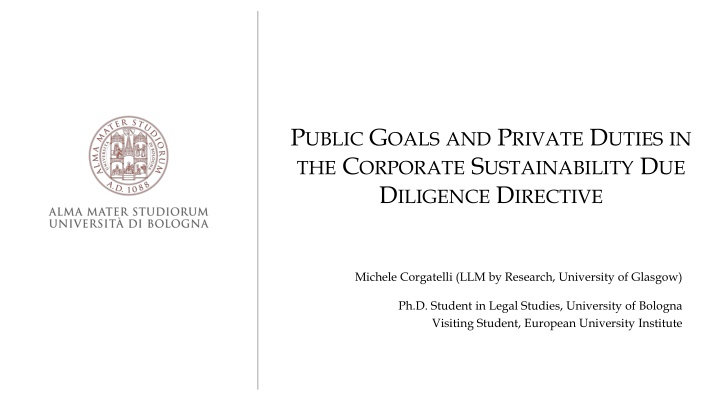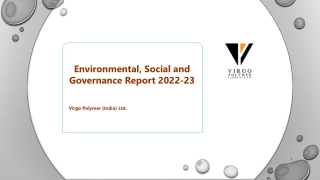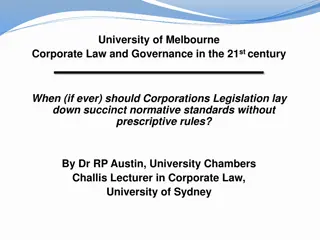Integrating Public Goals into Corporate Sustainability Duties
This paper by Michele Corgatelli explores the integration of public goals into the private duties of EU large companies, examining the implications on legal interpretation. It delves into various regulatory frameworks globally, discussing the scope, application, enforcement, and social-environmental aspects, aiming to provide context for corporate law scholars. The paper also discusses the levels of integration of public goals into private duties through international standards and treaties.
Download Presentation

Please find below an Image/Link to download the presentation.
The content on the website is provided AS IS for your information and personal use only. It may not be sold, licensed, or shared on other websites without obtaining consent from the author.If you encounter any issues during the download, it is possible that the publisher has removed the file from their server.
You are allowed to download the files provided on this website for personal or commercial use, subject to the condition that they are used lawfully. All files are the property of their respective owners.
The content on the website is provided AS IS for your information and personal use only. It may not be sold, licensed, or shared on other websites without obtaining consent from the author.
E N D
Presentation Transcript
PUBLIC GOALS AND PRIVATE DUTIES IN THE CORPORATE SUSTAINABILITY DUE DILIGENCE DIRECTIVE Michele Corgatelli (LLM by Research, University of Glasgow) Ph.D. Student in Legal Studies, University of Bologna Visiting Student, European University Institute
This paper aims at: Providing context to corporate law scholars Assessing the integration of public goals (set jointly by State actors) into the private duties of EU large companies Exploring the implications of this integration on the interpretation of the legal text 10
Context California Transparency in Supply Chains Act French Duty of Vigilance Law Dutch Responsible and Sustainable International Business Conduct Act Norwegian Supply Chain Transparency Act German Supply Chain Due Diligence Act Modern Slavery Act (UK, Australia, Canada) Dodd-Frank Wall Street Reform and Consumer Protection Act Regulation (EU) 2017/821 Scope of application Social v. environmental aspect Procedures established Enforcement (public v. private) 11
Four level of integration of public goals into private duties International standards UN Sustainable Goals Paris Agreement International Treaties listed in the Annex 13
CSDDD: adoption of due diligence policies identification of actual and potential adverse human rights and environmental impacts prevention contrast to actual adverse impacts complaints procedures monitoring communication 16
CSDDD: no poverty (n. 1) good health and well-being (n. 3) gender equality (n. 5) clean water and sanitation (n. 6) decent work and economic growth (n. 8) industry, innovation and infrastructure (n. 9) reduced inequalities (n. 10) peace, justice and strong institutions (n. 16) target n. 12.6 mentions the encouragement of sustainable corporate practices goal n. 17 designates a role for businesses in assisting governments in addressing the other state-centred Goals 20
An impossible goal? Art. 30 of the European Commission s proposal: the deadline for the transposition of the Directive is set at 2 years from the day of its entry into force Member States shall apply the provisions from 2 or 4 years from its entry into force on the basis of different thresholds related to the companies size The prevention and mitigation of potential adverse impacts through preventive action plans will require stakeholders (Art. 7) consultations with affected 21
Implications of the shift towards corporate sustainability due diligence The origins of the initiative are key to the interpretation of this legal text Business lawyers are familiar with the concept of due diligence business due diligence Overview of third parties conduct Impacts (double materiality principle) Risk management (= prevention of externalities) Costs Enforcement (public v. private) Extra-territorial effects (global value chains) International treaties (how can companies contribute?) 23
Thank you! michele.corgatelli@unibo.it https://www.unibo.it/sitoweb/michele.corgatelli/en www.unibo.it























